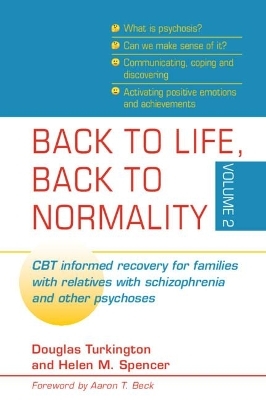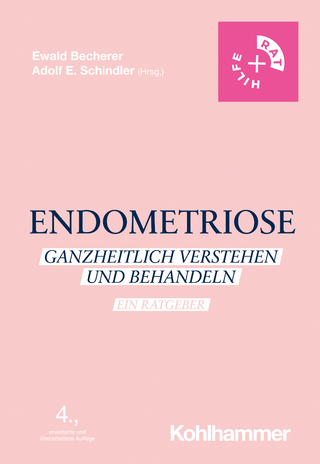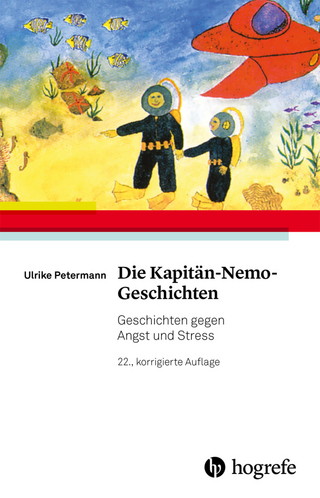
Back to Life, Back to Normality: Volume 2
Cambridge University Press (Verlag)
978-1-107-56483-1 (ISBN)
What do I do when my son or daughter appears to be hallucinating, paranoid or has stopped looking after themselves? Written for family members and friends of those who suffer from schizophrenia and other psychoses, Back to Life, Back to Normality 2 describes the typical symptoms and problems of those suffering from psychotic disorders and discusses how a relative can best listen, interact and communicate their support. Research conducted by authors Douglas Turkington and Helen Spencer has shown that individuals without psychiatric training and qualifications can easily learn and safely use some basic cognitive behavioural therapy (CBT) techniques to help communicate effectively and provide support to their loved one suffering from psychosis. These techniques are described and illustrated with examples throughout this book, to allow carers to learn how to provide the best possible support and help facilitate a recovery for those suffering.
Douglas Turkington, M.D. is Professor of Psychosocial Psychiatry at Newcastle University and Consultant Psychiatrist with Northumberland Tyne and Wear NHS Foundation Trust. He has been researching the subject of CBT for schizophrenia and other psychoses for over thirty years. His interactive workshops and demonstration videos have been influential in training mental health professionals and family members internationally. Helen M. Spencer, B.A. currently works as a Clinical Studies Officer for the Clinical Research Network (CRN), NIHR Portfolio Research Delivery Team (Mental Health) at Northumberland Tyne and Wear NHS Foundation Trust. She is an Associate Clinical Researcher at Newcastle University and also a Doctoral Researcher studying part-time for her Ph.D. in Psychology at Newcastle University. Helen has worked on numerous randomised controlled trials of CBT for schizophrenia and other psychoses and delivers annual workshops on the subject of Cognitive Behavioural Therapy for psychosis (CBTp) in both the UK and Norway.
1. What is Psychosis? What is schizophrenia? David Kingdon; 2. Psychosis usually has a natural tendency towards recovery Tom Christodoulides; 3. Positive aspects of psychosis: enhanced spirituality and creativity Maggie Douglas-Bailey; 4. When can psychosis escalate and will medicines help? Douglas Turkington; 5. Making sense of psychosis Helen M. Spencer; 6. What if the psychosis was linked to trauma? Lucy H. Stevens; 7. The 5 pillars of caring for psychosis Latoyah Lebert; 8. Effective coping: carer and service user self-care Latoyah Lebert; 9. Caring about delusions and other new beliefs Douglas Turkington; 10. Hearing voices, being paranoid and depressed: my recovery with CBT David Couper and Latoyah Lebert; 11. Dealing with visions Rob Dudley and Rea Wilson; 12. Compassion focused approaches for clients, family and health care providers C. Heriot-Maitland, E. Longden, K. Elliott, S. Bell, P. Gilbert and N. P. Wright; 13. Improving self-care, attention, motivation and social functioning Dawn Velligan and Matt Brown; 14. Where can we learn more? Robert Reiser, Nazneen Rustom and Jeremy Pelton.
| Erscheinungsdatum | 29.11.2018 |
|---|---|
| Zusatzinfo | 14 Halftones, black and white; 1 Line drawings, black and white |
| Verlagsort | Cambridge |
| Sprache | englisch |
| Maße | 156 x 234 mm |
| Gewicht | 250 g |
| Themenwelt | Sachbuch/Ratgeber ► Gesundheit / Leben / Psychologie ► Krankheiten / Heilverfahren |
| Geisteswissenschaften ► Psychologie ► Klinische Psychologie | |
| Medizin / Pharmazie ► Medizinische Fachgebiete ► Psychiatrie / Psychotherapie | |
| ISBN-10 | 1-107-56483-2 / 1107564832 |
| ISBN-13 | 978-1-107-56483-1 / 9781107564831 |
| Zustand | Neuware |
| Haben Sie eine Frage zum Produkt? |
aus dem Bereich


